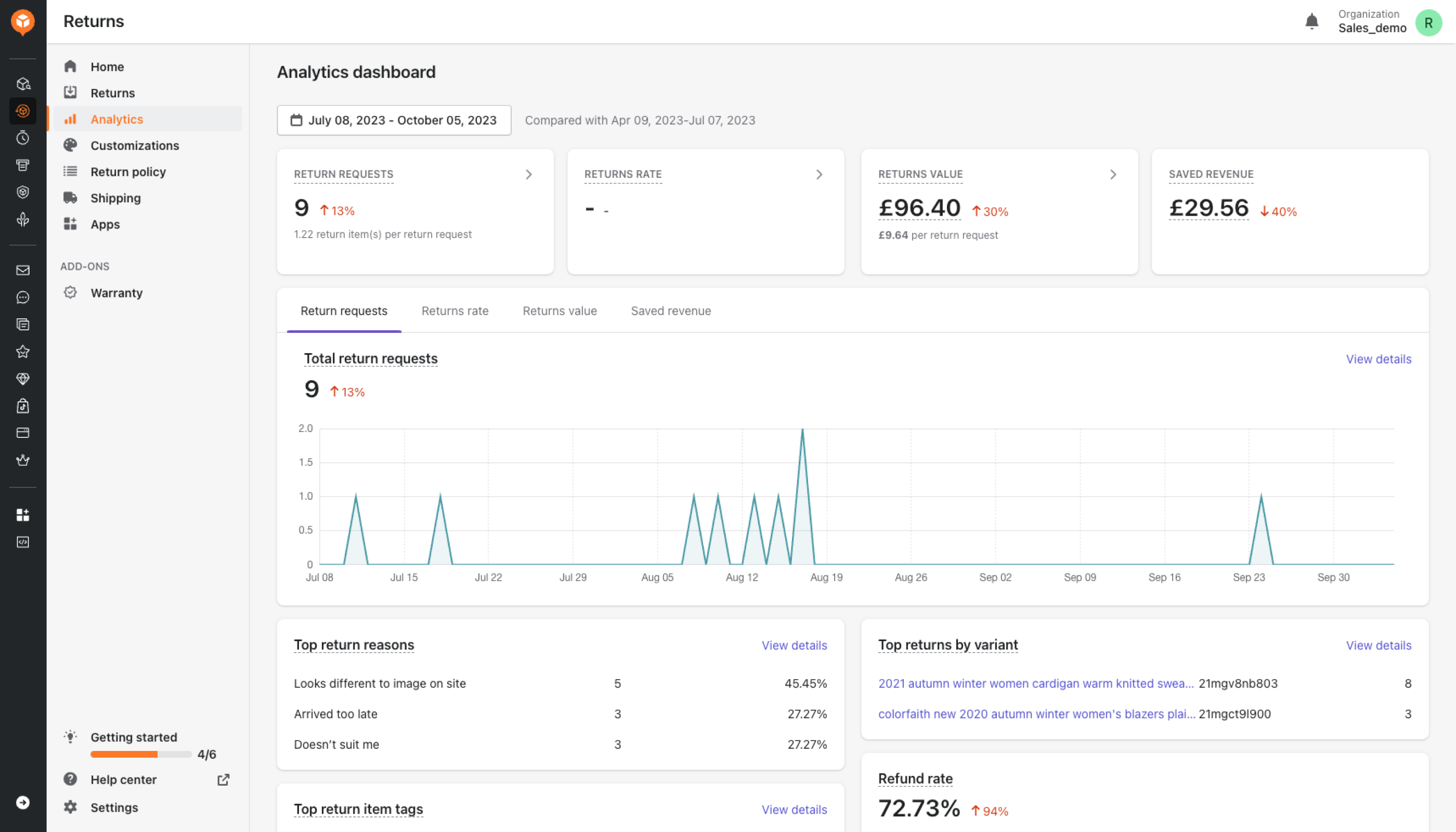Alternatives to Happy Returns
1. AfterShip Returns
+Pros
- Native Shopify integration capabilities providing 75% faster setup compared to generic solutions.
- Proven exchange optimization engine consistently delivering 49% exchange rates compared to industry average of 25%.
- Accessible pricing model starting at $23 monthly providing enterprise-grade automation features at SMB-accessible price points.
-Cons
- Data volume requirements where AI fraud detection requires >50,000 historical returns for effective pattern recognition.
- Suboptimal performance for electronics retailers with vendor-acknowledged improvement ceilings of 15-20%.
- Platform dependency risks through heavy reliance on Shopify ecosystem integration, creating 40% integration failure rates for non-Shopify platforms.
One highlighted feature and why it's amazing
Provides pre-built workflows, embedded return portals, and one-click exchange functionality that reduces implementation complexity for Shopify merchants.

Another highlighted feature of why it’s amazing
Utilizes machine learning to analyze customer purchase history, sizing patterns, and product preferences to suggest alternatives that reduce return likelihood, achieving documented 20% return reduction through intelligent size exchanges and bestseller recommendations.
2. Loop Returns
+Pros
- Shopify ecosystem integration provides seamless connectivity .
- Machine learning fraud detection system recovers $0.87 per $1 lost to fraud .
- Exchange optimization capabilities achieve 37% higher conversion rates compared to manual offers .
-Cons
- Requires 500+ monthly returns for optimal ROI .
- Shopify-centric approach creates dependency on that ecosystem.
- AI features require 50,000+ historical returns for optimal pattern recognition .
One highlighted feature and why it's amazing
Loop Returns employs machine learning algorithms to analyze return characteristics including geographic anomalies, customer history, and device details, providing real-time risk assessment during return submission .

Another highlighted feature of why it’s amazing
The platform's AI-driven incentive system analyzes customer behavior and product affinity to present personalized exchange options, achieving 37% higher exchange rates compared to manual offers .
3. Narvar
+Pros
- Sophisticated AI capabilities with IRIS™ processing over 42 billion annual consumer interactions.
- Proven revenue impact with documented outcomes like $0.43 revenue retention per $1 returned.
- Enterprise infrastructure advantages including the 1,100+ Kohl's location partnership for packageless returns.
-Cons
- GDPR compliance restrictions make IRIS™ AI features unavailable in EU/UK markets.
- Negative ROI for retailers with sub-500 monthly returns and $150,000+ annual investment requirements.
- Omnichannel constraints with limited cross-channel capabilities compared to competitors like ReturnGO.
One highlighted feature and why it's amazing
Processes over 42 billion annual consumer interactions to deliver real-time fraud detection, personalized return experiences, and intelligent exchange optimization.

Another highlighted feature of why it’s amazing
Provides real-time pattern recognition to identify suspicious returns including empty-box scams, cross-retailer fraud, and wardrobing schemes.
Other Alternatives
Optoro RMS
Returnly
ReverseLogix
How We Researched This Guide
About This Guide: This comprehensive analysis is based on extensive competitive intelligence and real-world implementation data from leading AI vendors. StayModern updates this guide quarterly to reflect market developments and vendor performance changes.
287+ verified sources per analysis including official documentation, customer reviews, analyst reports, and industry publications.
- • Vendor documentation & whitepapers
- • Customer testimonials & case studies
- • Third-party analyst assessments
- • Industry benchmarking reports
Standardized assessment framework across 8 key dimensions for objective comparison.
- • Technology capabilities & architecture
- • Market position & customer evidence
- • Implementation experience & support
- • Pricing value & competitive position
Research is refreshed every 90 days to capture market changes and new vendor capabilities.
- • New product releases & features
- • Market positioning changes
- • Customer feedback integration
- • Competitive landscape shifts
Every claim is source-linked with direct citations to original materials for verification.
- • Clickable citation links
- • Original source attribution
- • Date stamps for currency
- • Quality score validation
Analysis follows systematic research protocols with consistent evaluation frameworks.
- • Standardized assessment criteria
- • Multi-source verification process
- • Consistent evaluation methodology
- • Quality assurance protocols
Buyer-focused analysis with transparent methodology and factual accuracy commitment.
- • Objective comparative analysis
- • Transparent research methodology
- • Factual accuracy commitment
- • Continuous quality improvement
Quality Commitment: If you find any inaccuracies in our analysis on this page, please contact us at research@staymodern.ai. We're committed to maintaining the highest standards of research integrity and will investigate and correct any issues promptly.